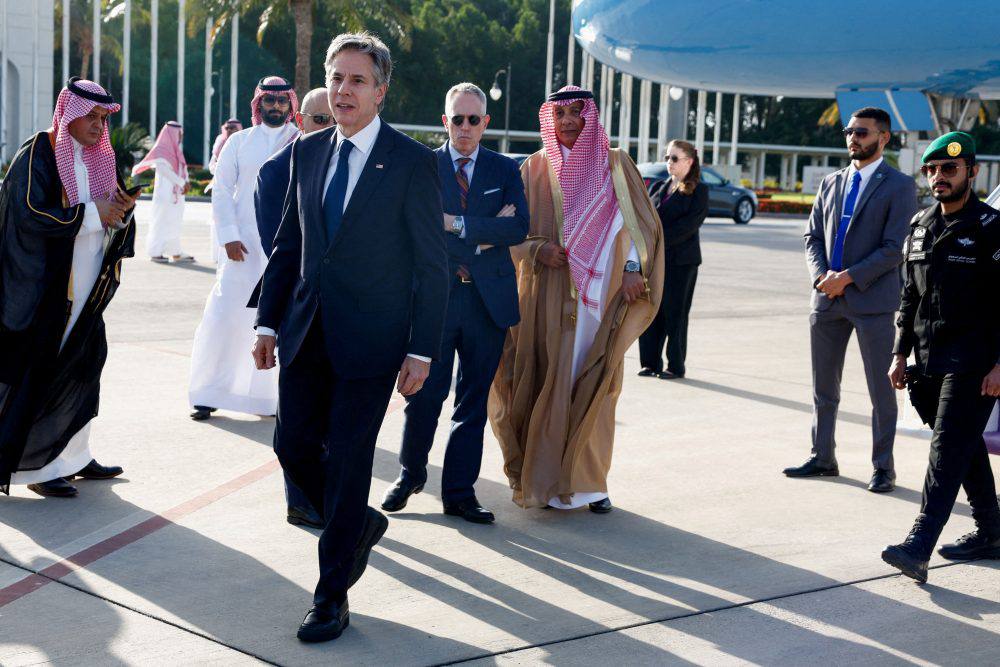Blinken’s Success or Deadlock in the Middle East
During his visit to the Middle East last week, Antony Blinken, the US Secretary of State, visited the region for the seventh time after the October 7 incident. Blinken, in his trip to Saudi Arabia, Jordan, and Israel, discussed the humanitarian crisis in Gaza and the ceasefire prospects. In this trip, the US Secretary of State also emphasized on bilateral cooperation between Washington and regional allies, especially Riyadh.
While Blinken was in the region, the proposal for a Gaza ceasefire, presented by Qatari, Egyptian, and American mediators, was discussed in Cairo. Despite some initial optimism, the outcome of ceasefire negotiations will ultimately depend on the calculations of the two parties involved in the conflict. If the negotiations fail, Israeli military operations in Rafah, which have so far been considered only as a looming threat, could become a reality. Without a clear and explicit plan to protect civilians, the humanitarian consequences of such a horrific attack will be severe and will weaken Israel’s position internationally. In these challenging circumstances, the management of the Gaza war by the Biden administration will also have an impact on US domestic policy.
While pro-Palestinian protests are sweeping through universities nationwide, Biden is currently facing a deep internal crisis that may impact his presidency’s election in November.
Challenges Ahead for Blinken
In his seventh trip to the region, Antony Blinken is facing multiple challenges. Blinken’s main goal for this trip to the Middle East is to secure an immediate ceasefire and subsequently the release of Israeli hostages. A new ceasefire proposal is on the table, reportedly including new incentives for Israel.
Blinken describes this agreement as extremely generous and urges Hamas to accept it. Part of his discussions with Arab ministers in this meeting is about the type of government and security in Gaza after the end of the war.
In reality, discussions about the ceasefire agreement and the release of hostages run parallel to US pressure for a broader agreement, including normalizing relations between Saudi Arabia and Israel and a path to forming an independent Palestinian state.
The US Secretary of State is also putting pressure on for sustainable humanitarian aid to Gaza, stating that significant increases are needed for the aid to prevent imminent famine, possibly accompanied by a cessation of hostilities.
Failure in negotiations leads to escalating tensions in the region.
The brinkmanship policy of going to the brink of negotiations over a ceasefire and the release of hostages between Israel and Hamas during the Gaza war has been evident, showing that both sides are playing hardball.
It seems that negotiations this week have hit a hard wall, and mediators are becoming disillusioned as they increasingly feel that every time progress is made, the parties involved move away from agreements that seemed to have been reached beforehand.
There is a growing sense that both sides are more interested in the current process than reaching a positive outcome. If this continues, there is a risk of Israel attacking Rafah, reigniting full-scale hostilities that could escalate tensions with Hezbollah in Lebanon and beyond.
Despite increasing differences, the US remains allied with Israel.
The United States is Israel’s most important ally since the terrorist attack by Hamas on October 7th. The Biden administration has been supporting Israel and its security needs ever since.
The US pressures for the release of hostages to prevent tensions along the Israel-Lebanon border, helps Israel to prevent missile attacks from Iran, and diplomatically supports Israel in UN mediation.
The United States is also seeking ways to advance a two-state solution and normalize relations between Israel and Saudi Arabia, both of which are crucial for Israel’s future.
While standing alongside Tel Aviv, the Biden administration has strongly criticized Prime Minister Netanyahu and his far-right allies, especially regarding his handling of the humanitarian situation in Gaza and the extremism of the settlers.
Netanyahu’s policies and goals for post-war regional future, which the United States is working to shape, are in conflict. This has recently led senior US officials to call for early elections in Israel, as most Israelis currently desire.
The Rafah operation is hindering arms sales to Israel.
If the United States conducts a military operation in Rafah, it may impose restrictions on arms sales to Tel Aviv. The US government has not yet taken military action in Rafah but remains concerned.
The Biden administration is currently focused on reaching an agreement for the release of hostages, as it enables a ceasefire and will help him initiate a process to advance his regional vision, which aims to enhance stability in the Middle East, deepen Israel’s integration, and normalize relations with Saudi Arabia.
There is increasing pressure on Israel from the Biden government, even at the Netanyahu level, and disclosures indicate that Israeli unilateral actions could lead to US countermeasures, including potential restrictions on arms sales. If Israel acts militarily, the United States will seek to influence the operation and may neutralize its actions.
University protests pose a new challenge for Biden.
The demonstrations by pro-Palestinian supporters in US universities are increasingly on the rise, and the Biden administration is primarily facing the challenge of incorporating their demands into its agenda, mainly due to its pro-Israel stance. Since the preliminary elections in Wisconsin, the White House’s attitude towards Netanyahu’s government has gradually toughened due to pressing electoral needs.
However, despite recent conflicts over Israel’s hostile stance, especially towards Iran, current events will heavily impact the overall situation of the government. Pro-Israel groups make up a significant portion of the Democratic base, and the pro-Israel vote will be a battlefield in the November elections.
The most likely course of action for the president is to walk a tightrope, trying to downplay the political significance of the demonstrations and taking into account polls showing that voters aged 18 to 29 have priorities other than foreign policy.
From an electoral standpoint, this is a potentially risky strategy. However, a more active position of highlighting party differences, and more importantly, those present in its electoral base, includes those who are clearly dissatisfied and angry with what is perceived as anti-Semitic rhetoric.
Persian
مشاهده این مقاله به زبان فارسی


